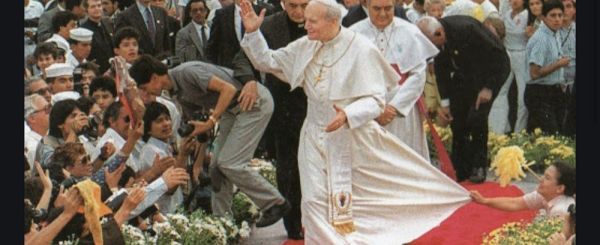1. With last Sunday, Palm Sunday, we entered the week which is called "holy" because in it we commemorate the principal events of our redemption. The heart of this week is the Triduum of the Passion and Resurrection of the Lord, who, as we read in the Roman Missal, "redeemed mankind and gave perfect glory to God principally through his paschal mystery: by dying he destroyed our death and by rising he restored our life. The Easter Triduum of the Passion and Resurrection of Christ is thus the culmination of the entire liturgical year" (General Norms for the Liturgical Year and the Calendar, n. 18). In the history of humanity there is no event more significant or of greater value. At the end of Lent, we are thus preparing to live fervently the days most important for our faith, and we intensify our commitment to follow Christ, Redeemer of man, with ever greater fidelity.
2. Holy Week leads us to meditate on the meaning of the Cross, in which "the revelation [of God's] merciful love attains its culmination" (cf. Dives in misericordia, n. 8). The theme of this third year of immediate preparation for the Great Jubilee of the Year 2000, dedicated to the Father, encourages us most particularly to reflect on this. His infinite mercy has saved us. In order to redeem humanity, he freely gave his Onlybegotten Son. How can we not thank him? History is illumined and guided by the incomparable event of the Redemption: God, rich in mercy, poured out his infinite goodness on every human being through Christ's sacrifice. How can we find an adequate way to express our gratitude? If, on the one hand, the liturgy of these days makes us offer a hymn of thanksgiving to the Lord, conqueror of death, at the same time it asks us to eliminate from our lives all that prevents us from conforming ourselves to him. We contemplate Christ in faith and re-examine the crucial points of the salvation he wrought. We recognize that we are sinners and confess our ingratitude, our infidelity and our indifference to his love. We need his forgiveness to purify us and sustain us in the commitment to interior conversion and a persevering renewal of our spirit.
3. "Have mercy on me, O God, according to your steadfast love; according to your abundant mercy blot out my transgressions. Wash me thoroughly from my iniquity, and cleanse me from my sin!" (Ps 51 [50]:1, 2). These words, which we proclaimed on Ash Wednesday, have accompanied us throughout our Lenten journey. They resound in our spirit with unique intensity in the imminence of the holy days, during which the extraordinary gift of the forgiveness of our sins, obtained for us by Jesus on the Cross, is renewed for us. Before the crucified Chist, an eloquent reminder of God's mercy, how can we not repent of our own sins and be converted to love? How can we not concretely repair the damage we have caused others and return goods acquired dishonestly? Forgiveness requires concrete actions: repentance is true and effective only when it is expressed in tangible acts of conversion and the proper reparation.
4. "Lord, in your great love, answer me!". Thus we are prompted to pray by today's liturgy for Wednesday of Holy Week, totally intent on the saving events we will be commemorating in the next few days. Today, as we proclaim Matthew's Gospel about the Passover and Judas' betrayal, we are already thinking of the solemn Mass "in Cena Domini" tomorrow afternoon, which will recall the institution of the priesthood and the Eucharist, as well as the "new" commandment of fraternal love which the Lord left us on the eve of his death.
This evocative celebration will be preceded tomorrow morning by the Chrism Mass at which the Bishop presides, surrounded by his priests. The sacred oils for Baptism, the Anointing of the Sick and Chrism are blessed. In the evening, then, when the Mass "in Cena Domini" is over, there will be a time of adoration, in response as it were to Jesus' invitation to his disciples on the tragic night of his agony: "remain here, and watch with me" (Mt 26:38).
Good Friday is a day of great emotion, on which the Church will have us listen once again to the account of Christ's Passion. The "veneration" of the Cross will be the centre of the liturgy celebrated on that day, while the ecclesial community prays intensely for the needs of believers and of the whole world.
A moment of deep silence follows. Everything will remain quiet until the night of Holy Saturday. Joy and light will burst into the darkness with the evocative rites of the Easter Vigil and the festive singing of the Alleluia. It will be an encounter in faith with the risen Christ and our Easter joy will be prolonged throughout the 50 days that follow.
5. Dear brothers and sisters, let us prepare ourselves to relive these events with deep fervour together with Mary most holy, present at every moment of her Son's Passion and a witness to his Resurrection. A Polish hymn says: "Blessed Mother, we raise our cry to your heart pierced by the sword of sorrow!". Mary, accept our prayers and the sacrifices of those who are suffering; strengthen our Lenten resolutions and accompany us as we follow Jesus at the time of his ultimate trial. Christ, tortured and crucified, is the source of strength and sign of hope for all believers and for all humanity.
[Pope John Paul II, General Audience 31 March 1999]












